
Sullivan's Travels is writer/director Preston Sturges' heartfelt tribute to the power of comedy, to the value of laughter and escapism as ways of coping with hardship. The Sullivan of the title is John L. Sullivan (Joel McCrea), a very successful Hollywood director whose light slapstick comedies have made him and his producers a fortune. Still, he yearns to make more serious pictures, films that deal with poverty and depression and social problems. Unfortunately, he quickly realizes that as a successful, wealthy man, he knows very little about such things, and he decides to learn. Dressing up as a bum and going out into the world with just a dime in his pocket, Sullivan tries to experience poverty and misery so that he can make a film about it, but he finds it harder than he thought to break free of his privilege and status. First, his producers insist on saddling him with a massive camper van full of handlers, cooks, journalists and doctors to make sure that Sullivan's adventures don't get too out of control. And the director's various attempts to escape this bunch don't fare much better: first he winds up in the clutches of a sexed-up farmer's widow who dresses him up in fancy clothes and locks him in for the night, but even after escaping from her he can't seem to manage to truly get away from his privilege.
That changes somewhat when he meets a girl (Veronica Lake, whose character never gets a name), a down on her luck aspiring actress who's giving up on Hollywood and heading home, but still has the kindness to buy breakfast for the bum she sees in a diner. She's soon tipped off to Sullivan's ruse, and though angry at first, she obviously takes to this stubborn, adventurous guy who's so determined to experience a different way of living. Sullivan's producers always insist that the director's films should have "a little bit of sex" no matter how serious they are, and Lake is this film's little bit of sex, looking glamorous and incongruously sexy when she first meets Sullivan, like a noir femme fatale who's stumbled into a comedy. She's unnamed because she fulfills an iconic role: she's "the girl," and "there's always a girl in the picture," as Sullivan says. In that sense, there's something cynical about her inclusion, as though Sturges was acknowledging that he too is bowing to studio pressure, that he too has to include "a little bit of sex" if he wants anyone to see his pictures. Nevertheless, the girl proves eager to accompany Sullivan on his tramp's journey, and the two of them head off together.
The film is often funny, manically comic in the style of old silent movie farces. It is, based on the descriptions of Sullivan's movies in the script, the kind of movie that Sullivan himself was making before his awakening to "social problems." The action is often sped up and frenzied, never more so than in the early scene where Sullivan hitches a ride with a kid playing army in a souped-up go-cart that he calls a "tank." As the tank blasts down the road at 120 mph — the speedometer is permanently drawn in this position, and it doesn't look like the cart's capable of going any slower — the pursuing van of movie studio handlers tries desperately to keep up, tossing everyone inside around the interior. The sequence is an excuse for one slapstick gag after another, the best of which is probably the moment when the cook's head bursts through the roof of the van and he finds himself looking around confusedly. Later, Sullivan and the girl's adventures on the road have some of the same slapstick glee, Sturges' tribute to Chaplin, who is also referenced in several shots that recall, naturally, The Tramp.

Ultimately, Sullivan's journey seems to have come to an end, he's experienced some misery and poverty — mostly conveyed through a long, dialogue-free montage — and he's ready to call it quits. But he goes out for one last charity mission, handing out five-dollar bills to tramps, and after one knocks him out and robs him, Sullivan is thrown on a train heading east, thought to be dead by everyone back in Hollywood. Instead, he's very much alive but badly dazed, and soon finds himself in a prison work camp after getting in a fight with a railroad employee. The film's final section is a harrowing, exaggerated depiction of the horrors of prison, more terrifying in its depiction of the loss of identity and privilege than Hitchcock's The Wrong Man. Of course, Sullivan's tenure there doesn't actually last that long, only long enough for him to go with the other inmates to see a movie at a local black church, where the pastor encourages his congregation to welcome these less fortunate men. They watch a Disney cartoon, and the laughing Sullivan realizes that comedy brings happiness to people in hard times. This scene is a stark contrast to an earlier scene of Sullivan at the movies with the farmer's widow, where they'd gone to see a bill of serious dramas, and the whole theater sat in joyless lethargy staring at the screen and fumbling noisily with popcorn.
The ending of the film is interesting and complex, consolidating what Sturges had been driving at throughout the film. After all his adventures and mishaps, Sullivan gets the girl and easily regains his privilege — once everyone learns he's a movie director, he's immediately released from prison, which might be a wry commentary about the disparate punishments for the wealthy and the poor, or might be simply a cynical deus ex machina in which the God in the machine is Hollywood's sense of entitlement. In any event, Sullivan no longer has any interest in making the serious picture about the poor he'd intended; he wants to go back to making silly comedies. There's a weird ambivalence about this ending, an unresolved tension in the way the film deals with poverty. At the resolution, Sturges seems to reject any possibility of film dealing seriously with the state of the world — Sullivan's attempts to do so are mocked and dismissed, with Sullivan condemned as a "limousine liberal," even literally in the scene where his butlers drop him off at the train depot so he can hop on a freight.
The film mocks the condescension of elites who think they're making films about "social problems" to help the poor, but there's a different kind of condescension in the idea that the poor only want dumb escapism, that there's nothing anyone can do for the poor and unfortunate besides make them laugh. There's a troubling sense that Sturges' worldview has little room for social mobility, that the film believes, with Sullivan, that one should stay where one belongs and simply hope for a miracle like Sullivan's "discovery" of the girl. At the same time, however, the film provides ample evidence of alternate ways of dealing with poverty, like the compassion of the black church who welcome in hardened criminals for a night of entertainment, or the kindness of a lunch counter owner who, learning that Sullivan and the girl have no money, gives them coffee and donuts anyway. Sullivan's Travels is a smart — and very funny — film that is, above all, an ode to comedy, a love letter to Charlie Chaplin and all the other great comic performers who have graced the screen.

1 comment:
Although like many others I've seen this multiple times over the years, the recent trip in December to Manhattan's Film Forum to see it screened it's it's resplendent glory as part of the theatre's "Preston Sturges Film Festival" (with my site colleague Allan Fish, who was visiting from the U.K.) was quite an unforgettable experience.
I'd say this eccentric satire of this protean director of musical comedies, who prefers to create social treatises--like BROTHER, WHERE ART THOU?--is the director's masterpiece. Yeah a few others like THE LADY EVE, UNFAITHFULLY YOURS, MIRACLE AT MORGAN'S CREEK and HAIL THE CONQUERING HERO are within hailing distance, but this one's successful sharp satire on the morals of Hollywood and on American society as a whole is Sturges quintessential piece.
My favorite moments would include: the life in a chain gang sequence that recalls I AM A FUGITIVE FROM A CHAIN GANG; the fight with a bum in a railway yard, in which the bum knocks him out by then is crushed by a locomotive, the scene in the black church; and the scenes showing the rich Sullivan disguised as a poor vagabond, in the luxury of his mansion. But there's so much more to revel in, in what is surely one of cinema's greatest screenplays of all-time.
As to your contention here:
"There's a troubling sense that Sturges' worldview has little room for social mobility, that the film believes, with Sullivan, that one should stay where one belongs and simply hope for a miracle like Sullivan's "discovery" of the girl"..........I must say I don't buy it myself, and would subsequently agree with your "on the other hand" disclaimer that follows.
Among many excellently-written passages in this stellar review, I'll point out just one I loved:
"The film is often funny, manically comic in the style of old silent movie farces. It is, based on the descriptions of Sullivan's movies in the script, the kind of movie that Sullivan himself was making before his awakening to "social problems." The action is often sped up and frenzied, never more so than in the early scene where Sullivan hitches a ride with a kid playing army in a souped-up go-cart that he calls a "tank."
Post a Comment